Portal:History
The History Portal
History is the systematic study of the past. As an academic discipline, it analyzes and interprets evidence to construct narratives about what happened and explain why it happened, focusing primarily on the human past. Some theorists categorize history as a social science, while others see it as part of the humanities or consider it a hybrid discipline. Similar debates surround the purpose of history, for example, whether its main aim is theoretical, to uncover the truth, or practical, to learn lessons from the past. In a slightly different sense, the term history refers not to an academic field but to the past itself or to individual texts about the past.
History is a broad discipline encompassing many branches. Some focus on specific time periods, such as ancient history, while others concentrate on particular geographic regions, such as the history of Africa. Thematic categorizations include political history, social history, and economic history. Branches associated with specific research methods are quantitative history, comparative history, and oral history.
Historical research relies on primary and secondary sources to reconstruct past events and validate interpretations. Source criticism is used to evaluate these sources, assessing their authenticity, content, and reliability. Historians integrate the perspectives of several individual sources to develop a coherent narrative. Different schools of thought, such as positivism, the Annales school, Marxism, and postmodernism, have distinct methodological implications.
History emerged as a field of inquiry in the ancient period to replace myth-infused narratives, with influential early traditions originating in Greece, China, and later also in the Islamic world. Historical writing evolved throughout the ages and became increasingly professional, particularly during the 19th century, when a rigorous methodology and various academic institutions were established. History is related to many fields, including historiography, philosophy, education, and politics. (Full article...)
Featured picture
Did you know (auto generated)

- ... that interviews collected for a Boston College oral history project were used in two murder trials?
- ... that a 2001 book shares the history of a small Tudor community through a 54-year-long "running commentary" by "a somewhat unamiable busybody"?
- ... that an Armenian Apostolic Church lawsuit over the Zeytun Gospels led Heghnar Zeitlian Watenpaugh to write a history of its separated canon tables?
- ... that during the first tour to the Soviet Union by any American ballet company, Lupe Serrano danced the first encore in the American Ballet Theatre's history?
- ... that the 1976 Philippine film Itim was described as "one of the most remarkable debuts in cinema history" in a 2022 retrospective at the Museum of Modern Art?
- ... that the government of Victoria, Australia, has a program to remove 110 level crossings by 2030, the fastest rate in the state's history?
Roger Norreis (died between 1223 and 1225) was Abbot of Evesham in England. He was a controversial figure, installed in several offices against opposition. In his appointment to Evesham, he was accused of immoral behaviour and failing to follow monastic rules. In 1202, Norreis became embroiled in a dispute with his monks and his episcopal superior the Bishop of Worcester; litigation and argumentation lasted until his deposition in 1213. He was then appointed prior of a subsidiary monastic house of Evesham, but was deposed within months, then re-appointed to the office five years later.
Norreis has been described by modern historians as being unsuited for the religious positions to which he was appointed and by one of being completely unsuitable to hold any kind of spiritual role. Nevertheless, even his most severe contemporary critic, Thomas of Marlborough, one of his own monks at Evesham, conceded that Norreis was energetic, entertaining, and enterprising; during his time as abbot of Evesham Abbey he managed to complete the crossing tower of the monastic church. (Full article...)
On this day
February 7: Independence Day in Grenada (1974)

- 1365 – Albert, King of Sweden, granted a town charter to Ulvila, the third-oldest city in Finland.
- 1813 – Napoleonic Wars: Two evenly matched frigates, the French Aréthuse and the British Amelia, battled to a stalemate (depicted) at the Îles de Los off the Guinean coast.
- 1865 – The trustees of Seattle enacted an ordinance that expelled Native Americans from the newly incorporated town.
- 1900 – Second Boer War: British troops made a third unsuccessful attempt to lift the siege of Ladysmith in the Battle of Vaal Krantz.
- 2014 – Researchers announced the discovery of the Happisburgh footprints in Norfolk, England, the oldest known hominid footprints outside Africa, at more than 800,000 years old.
- Alfonsina Orsini (d. 1520)
- Margaret Fownes-Luttrell (b. 1726)
- Louisa Jane Hall (b. 1802)
- Anne Morrow Lindbergh (d. 2001)
Selected quote
Victorious warriors win first and then go to war, while defeated warriors go to war first and then seek to win.
— Sun Tzu, Ancient Chinese military strategist
Related portals
More Did you know...
- ... that on 26 April 1881 HMS Doterel (pictured) exploded, killing 143 of the 155 crew members?
- ... that causes of the deaths at the Berlin Wall included shooting, drowning, suffocation, suicide, and falling from a balloon?
- ... that the 19th-century swindler Bertha Heyman, known as "The Confidence Queen," conned men by pretending to be a wealthy woman who was unable to access her fortune?
- ... that only four great uncial codices have survived until the present day?
- ... that after World War II, Polish resistance organizer and Warsaw Uprising fighter Jan Mazurkiewicz was brutally tortured by the authorities in communist Poland?
- ... that tiny Paederus beetles may have caused some of the ten Plagues of Egypt?
- ... that the only known report of bloodshed during the simulated Nazi invasion of Winnipeg was from a woman who cut her thumb while preparing toast?
- ... that Dacian bracelets were used as currency and votive offerings?
Topics
Categories

History • By period • By region • By topic • By ethnic group • Historiography • Archaeology • Books • Maps • Images • Magazines • Organizations • Fictional • Museums • Pseudohistory • Stubs • Timelines • Chronology • People • Wikipedia historians
WikiProjects
![]() WikiProject History •
Ancient Near East • Australian History • Classical Greece and Rome • Dacia • Former countries • History of Canada • Chinese history • European history • Heraldry and vexillology • Indian history • Jewish history • Medieval Scotland • Mesoamerica • Military history • Middle Ages • History of Science
WikiProject History •
Ancient Near East • Australian History • Classical Greece and Rome • Dacia • Former countries • History of Canada • Chinese history • European history • Heraldry and vexillology • Indian history • Jewish history • Medieval Scotland • Mesoamerica • Military history • Middle Ages • History of Science
WikiProject Time • Days of the Year • Years
WikiProject Biography • Composers • Political figures • Saints • United States Presidents
Things you can do
 |
Here are some tasks awaiting attention:
|
Associated Wikimedia
The following Wikimedia Foundation sister projects provide more on this subject:
-
Commons
Free media repository -
Wikibooks
Free textbooks and manuals -
Wikidata
Free knowledge base -
Wikinews
Free-content news -
Wikiquote
Collection of quotations -
Wikisource
Free-content library -
Wikiversity
Free learning tools -
Wiktionary
Dictionary and thesaurus





















































